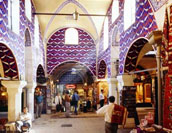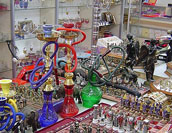 |
 |
| |
|
| |
SHOPPING GUIDELINES IN TURKEY

|
| |
|
|
|
| |
When you are in a trip, it is not just seeing the
beautiful places, meeting new friends or having a nibble of the
local cuisines but you also want to buy and keep something for
yourself as the trip will be over.
In most countries, US$ are accepted other than the local currency,
so it’s suggested to bring $1 and other small bills.
Here are some approaches that you can consider while in a tour and
have plans of shopping around:
• Have fun while shopping. Bargaining a sale should be of
advantage to both parties, not a trouble situation. Handle
the process with a sense of delight. Perhaps, you can’t
affront the vendor, and there should be nothing they say to
you that you will take personally. Treat it as a game of
possibility. If you have difficulties in sharing thoughts in
one familiar word, you can use body movements. Many vendors
have calculators to make your offer agreeable. Record your
respond to make a proposal if ever the seller has some
difficulties in understanding your offer.
• Pay only what is worth for you. When purchasing
products, ask what the product is made of, especially in
covered bazaars, markets and souks. Think twice about claims
that seem like exceptional. Don’t expect to buy a horse for
dog prices. Ask questions before making any offer. Consider
several items. You may not want to end up having premium
jewelry or antiques for a worthless item, however beware
since it has the possibility to happen. Choose items for a
reason that it is valuable for you, not because it’s
declared to be pure precious stone or genuine silver. In
Turkey, you must look for handcrafted items since you are
not bargaining for the item, but for the value per gram of
silver, and so on.
• Sellers are not hard to find. You don’t have to
worry if you find to little offers. They are probably
waiting for you to give a little more effort and add more
prices to bargain. On odd situations, a seller might say
it’s too low and quit, so you have the choice to raise your
price or try somewhere else. Leaving will let you know if
your price is within the price range offered by the seller.
|
|
| |
 |
 |
 |
 |
|
| |
|
|
|
| |
|
• Lowering offers at the beginning
of a trip is an exceptional way to measure the marketplace, while
there are no rules for pricing and it will differ from market to
market or from city to city. Some guidelines or information’s will
tell you to offer 1/3 or 1/2 the asking price, but wise vendors have
already the knowledge about these tips or guidelines as well. This
general rule can help you earn big amount of money, only if the
vendors are asking you 5 or even 10 times what the actual cost of
the item. Items in tourist areas are expected to be overstated
compared to a short term area, such as a tourist boat or bus or
outside a museum or other attraction. So, you should be ready to
bargain promptly and harshly. These are some of those places where
you can get very good prices, since the vendors sell high big volume
with a high cost. However, never make a bargain if you are not
concerned in the item anymore. |
|
| |
It is so offensive to make an offer and then not respect
it, especially if the seller agreed upon your offer. Once you name a
price, you should be ready to pay that price if the seller agrees.
On the other hand, you are not obliged to come around a close the
agreement. |
|
| |
|
|
| |
Have a quantity discounts. You can combine several items like
starting to bargain for one item, and then offer to buy 2 for a
lower price. If the bargaining is cut out, add another item to the
pile and agree to the buyer’s last offer.
These are some of the general rules when you make your
negotiation for sales or purchase in Turkey. Grab the chance to
bargain and pay for the item worth the price. However, stop on your
own gain, ask the seller how to tell their first-rate emerald from
what you just noticed on the street for 1/10 the price.
|
|
| |
|
|
| |
|
|
| |
|
|
<-Back |
|
|
 |
|
